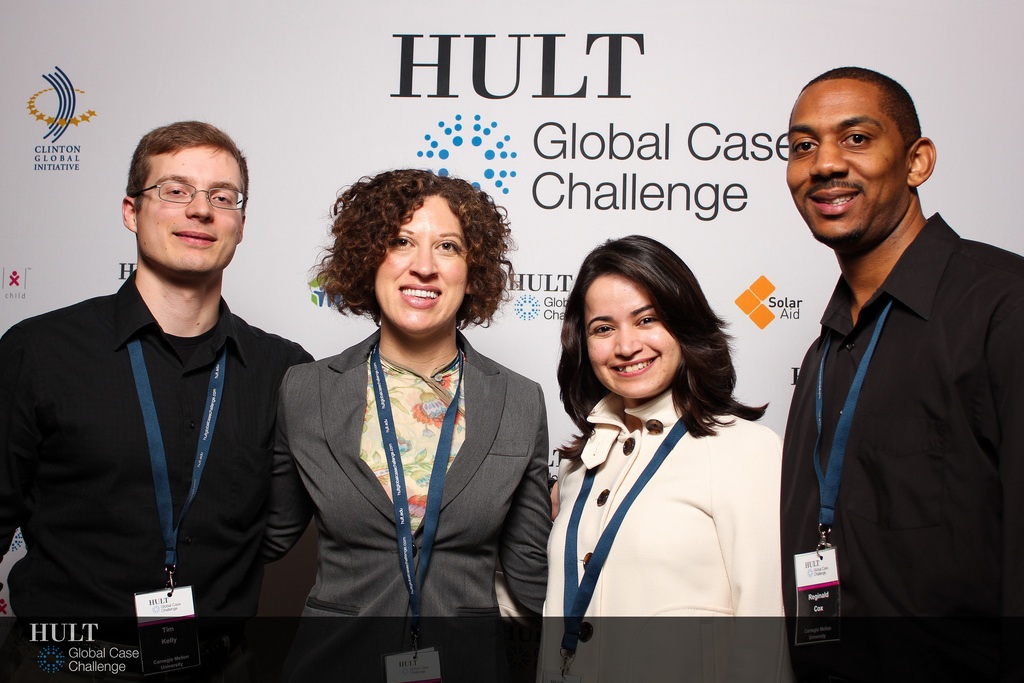Co-written by Tim Kelly (pictured below, far left), Beth Cullinan (second to left), Reggie Cox (far right)

"We want to change the world" is a phrase that resonates amongst all students at Heinz College, Carnegie Mellon University. Our team met while analyzing case studies in an Organizational Management course in fall 2011, and leapt at the opportunity of continuing to work together for competing on a social issue, at the Hult Global Case Challenge. Promoting education had been the common thread that tied together our individual efforts; our team's experiences ranging from local to international initiatives, including the Pittsburgh public school system, Summer Engineering Experience for Girls, Everyday Inspirations, and Engineers Without Borders. Based on these experiences, our team, which is Reggie Cox, Beth Cullinan, Ketaki Desai and Tim Kelly, was able to create a solution that we believe can be put into action immediately.
Based on the experiences of Carnegie Mellon students who worked with One Laptop Per Child in Kigali, Rwanda, as well as discussions with several grassroots volunteers, our team identified three key areas of focus for OLPC moving forward: (1) strategically selecting countries to target, (2) ensuring streamlined laptop deployment, and (3) creating a global brand for the open-source XO software, adding value to the existing hardware.
Our solution incorporates data on basic human needs, as well GDP, to develop a strategy that will allow us to reach countries worldwide. Once on the ground, we will build on established partnerships with nonprofits to ensure the communities receiving the laptops feel a strong sense of ownership. On the software side, we will crowdsource educational applications to developers around the world, adding value to the existing programs created by Sugar Labs. Finally, we will create an online community for students to interact globally and rate these applications. This not only advances OLPC's mission of providing education to the world's poorest children, but also delivers it to those children in the developed world who will greatly benefit from the XO laptop. Our solution will revolutionize how children worldwide can connect and create an ever-evolving network for education and learning. The computers will supplement teachers' efforts by encouraging students to actively learn in and out of the classroom, regardless of the technology available to them at home.
We continue to be inspired by the sincere dedication of everyone we met at the Boston Regional Finals -- enthusiastic students who are helping the three NGOs participating in the Hult Global Case Challenge (One Laptop Per Child, Solar Aid and Habitat for Humanity) achieve their missions. Even though each attendee was highly aware we were all competing for one available position in the final round, that didn't prevent the open exchange of ideas on how to make what many consider impossible dreams a reality in the not-so-distant future. With the number of brilliant young minds we interacted with, it's only a matter of time before the challenges we face in education, energy and housing are a distant memory.
Advancing to the final round of this competition has validated the choice each of us made to enroll in the Heinz College's Master of Public Management program at Carnegie Mellon University. Every aspect of our education has proven invaluable to our team's success so far. Our curriculum (which includes policy analysis, management, research methods, economics, and information systems) allows us to thoroughly critique our own ideas from the viewpoint of multiple disciplines before sharing them with others. The diversity we encounter every day, whether it is racial, socioeconomic, or based on life experiences of the student populace, allows us to examine any issue from a global perspective; and without constraining it with any inherent biases. This is reflected in our team's makeup for this case challenge, as well.
In turn, the Hult Global Case Challenge has impacted our studies and the lessons we learned will remain with us for life. It has shown us that by investing the time and energy necessary to evaluate every possible cause and effect, a group of students can tackle any challenge with conviction. The task can be as straightforward and self-contained as determining a course of action after reading a three-page case study, or as complex and far reaching as developing a plan to change how the world educates its children. As long as you work through every detail and learn how to constructively disagree as a team, any problem becomes nothing more than a series of small, manageable decisions.
"You don't have to change the world by yourself," is our advice to anyone interested in championing for a social cause, as a takeaway from our experience with the Hult Global Case Challenge. Connect with others, learn from what they've already accomplished, and share your talents to work together toward achieving a common goal. These are daunting issues, and we are confronted with an enormous number of hurdles along the road to success. The only way we are going to get there is by putting in our best efforts, sharing resources, and not worrying who gets the credit.
"The issues that you have chosen to fight against, you didn't create. Don't be too hard on yourself!" --Bill Strickland, Philanthropy Forum, University of Pittsburgh's Graduate School of Public Affairs.